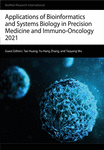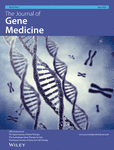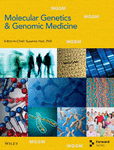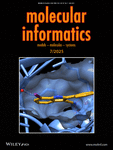Journal list menu
Export Citations
Download PDFs
Retraction
Open Access
oa
Retracted: Effects of Pulmonary Surfactant Combined with Noninvasive Positive Pressure Ventilation on KRT-14 and ET-1 Levels in Peripheral Blood and Therapeutic Effects in Neonates with Respiratory Distress Syndrome
- First Published: 20 March 2024
Retraction
Open Access
oa
Retracted: 3D Printed Guides and Preoperative Planning for Uncemented Stem Anteversion Reconstruction during Hip Arthroplasty: A Pilot Study
- First Published: 20 March 2024
Retraction
Open Access
oa
Retracted: A Systematic Analysis on COVID-19 Patients in Inner Mongolia Based on Dynamic Monitoring
- First Published: 20 March 2024
Retraction
Open Access
oa
Retracted: Assembly of 97 Novel Bacterial Genomes in the Microbial Community Affiliated with Polyvinyl Alcohol in Soil of Northern China
- First Published: 20 March 2024
Retraction
Open Access
oa
Retracted: The Early Diagnostic Efficacy of Serum Histone H3 in Rabbit Urosepsis Model
- First Published: 20 March 2024
Retraction
Open Access
oa
Retracted: miR-339-5p Inhibits Autophagy to Reduce the Resistance of Laryngeal Carcinoma on Cisplatin via Targeting TAK1
- First Published: 20 March 2024
Retraction
Open Access
oa
Retracted: Upregulation of miR-29c-3p Hinders Melanoma Progression by Inhibiting CDCA4 Expression
- First Published: 20 March 2024
Retraction
Open Access
oa
Retracted: A Systematic Review and Meta-Analysis of the SuperPATH Approach in Hip Arthroplasty
- First Published: 20 March 2024
Retraction
Open Access
oa
Retracted: Pentoxifylline Can Reduce the Inflammation Caused by LPS after Inhibiting Autophagy in RAW264.7 Macrophage Cells
- First Published: 20 March 2024
Retraction
Open Access
oa
Retracted: Astragalin Protects against Spinal Cord Ischemia Reperfusion Injury through Attenuating Oxidative Stress-Induced Necroptosis
- First Published: 20 March 2024
Retraction
Open Access
oa
Retracted: N-Acetylcysteine Improves Inflammatory Response in COPD Patients by Regulating Th17/Treg Balance through Hypoxia Inducible Factor-1α Pathway
- First Published: 20 March 2024
Research Article
Open Access
oa
[Retracted] Assembly of 97 Novel Bacterial Genomes in the Microbial Community Affiliated with Polyvinyl Alcohol in Soil of Northern China
- First Published: 18 January 2022
Research Article
Open Access
oa
[Retracted] Effects of Pulmonary Surfactant Combined with Noninvasive Positive Pressure Ventilation on KRT-14 and ET-1 Levels in Peripheral Blood and Therapeutic Effects in Neonates with Respiratory Distress Syndrome
- First Published: 31 October 2021
Research Article
Open Access
oa
[Retracted] Astragalin Protects against Spinal Cord Ischemia Reperfusion Injury through Attenuating Oxidative Stress-Induced Necroptosis
- First Published: 28 October 2021
Research Article
Open Access
oa
Identification and Validation of a Dysregulated miRNA-Associated mRNA Network in Temporal Lobe Epilepsy
- First Published: 22 October 2021
Research Article
Open Access
oa
[Retracted] Upregulation of miR-29c-3p Hinders Melanoma Progression by Inhibiting CDCA4 Expression
- First Published: 29 August 2021
Research Article
Open Access
oa
[Retracted] miR-339-5p Inhibits Autophagy to Reduce the Resistance of Laryngeal Carcinoma on Cisplatin via Targeting TAK1
- First Published: 04 August 2021
Research Article
Open Access
oa
[Retracted] A Systematic Review and Meta-Analysis of the SuperPATH Approach in Hip Arthroplasty
- First Published: 22 July 2021
Research Article
Open Access
oa
Study of the G Protein Nucleolar 2 Value in Liver Hepatocellular Carcinoma Treatment and Prognosis
- First Published: 20 July 2021
Research Article
Open Access
oa
[Retracted] The Early Diagnostic Efficacy of Serum Histone H3 in Rabbit Urosepsis Model
- First Published: 17 July 2021








